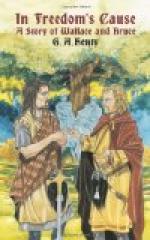Percy, with his followers, remained shut up in the castle, while Bruce overran the neighbouring country; but an English force under Sir Roger St. John, far too powerful to be resisted, advanced to Turnberry, and Bruce and his followers were obliged to seek refuge in the hills. Thomas and Alexander, the king’s brothers, with Sir Reginald Crawford, had gone to the islands to beat up recruits, and returning in a vessel with a party who had joined them, landed at Loch Ryan. They were attacked at once by Macdowall, a chieftain of Galloway, and routed. The king’s brothers, with Sir Reginald Crawford, were carried to Carlisle severely wounded, and delivered over to King Edward, who at once sent them to the scaffold.
These wholesale and barbarous executions saddened the Scots, and, as might be expected, soon roused them to severe reprisals. Bruce himself, however, although deeply stirred by the murder of his three brothers and many dear friends, and by the captivity and harsh treatment of his wife and female relatives, never attempted to take vengeance for them upon those who fell into his hands, and during the whole of the war in no single instance did he put a prisoner to death. He carried magnanimity, indeed, almost to the extent of impolicy; for had the nobles of England found that those of their number who fell into Bruce’s hands suffered the penalty of death, which Edward inflicted upon the Scotch prisoners, they would probably have remonstrated with the king and insisted upon his conducting the war in a less barbarous and ferocious fashion.
Sir James Douglas was so stirred by the murder of the three Bruces and so many of his friends and companions, that he resolved henceforth to wage an exterminating war against the English, and by the recapture of his own stronghold, known as Castle Douglas, began the series of desperate deeds which won for him the name of the Black Douglas, and rendered his name for generations a terror among the English on the Border. The castle had been conferred by Edward on Sir Robert de Clifford, and was occupied by an English garrison. Douglas revealed his intention only to Archie Forbes, who at once agreed to accompany him. He asked leave from the king to quit their hiding place for a time, accompanied by Archie, in order to revisit Douglas Hall, and see how it fared with his tenants and friends. The king acquiesced with difficulty, as he thought the expedition a dangerous one, and feared that the youth and impetuosity of Douglas might lead him into danger; before consenting he strongly urged on Archie to keep a strict watch over the doings of the young noble.




